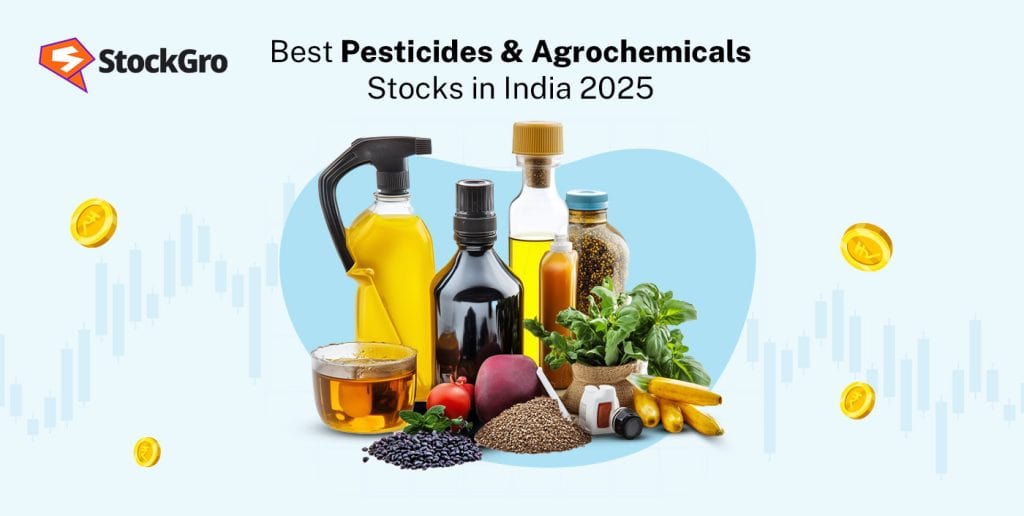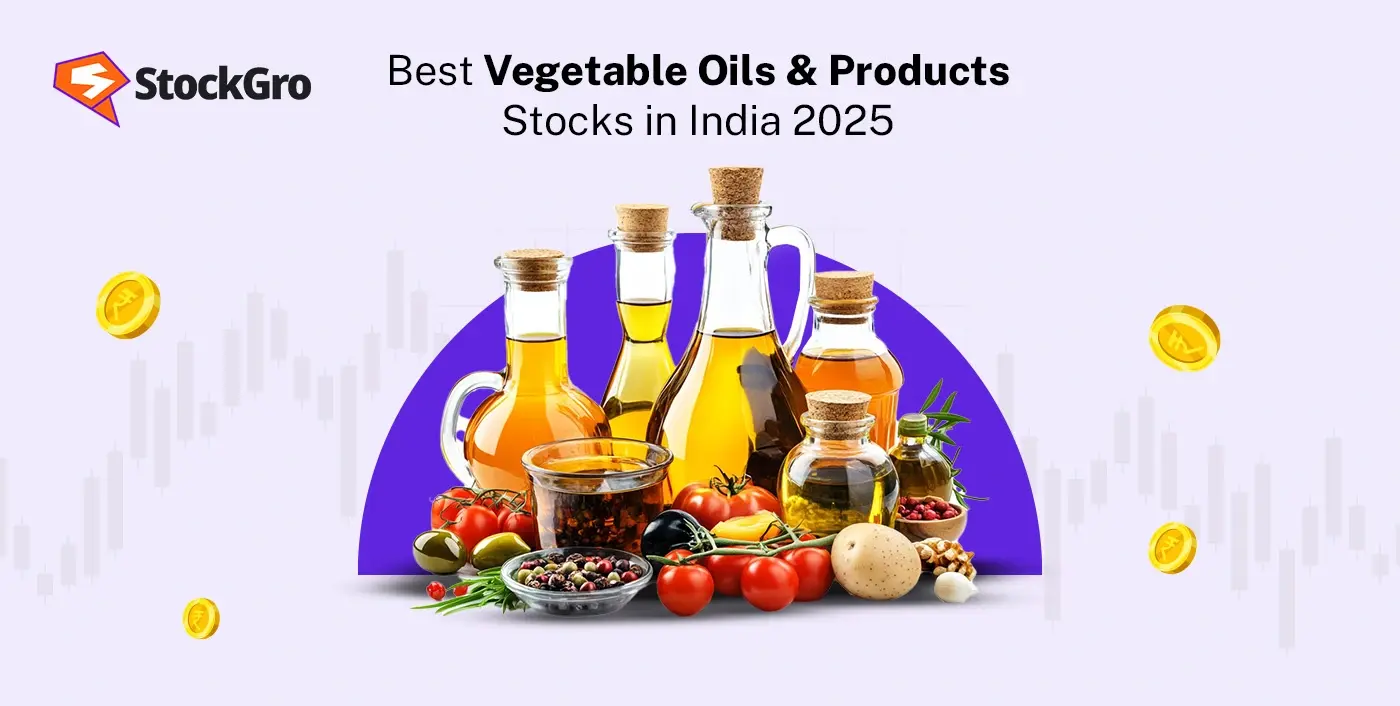
When the incomes in a country rise, the dietary patterns of people also change. This leads to an increased demand for food and thus a need for increased crop productivity arises. Agriculture and allied activities contributed 16% to the Indian GDP in FY24.
The use of pesticides and fertilisers increases the production of crops significantly and prevents crop failures. The Indian agrochemical market is estimated to be $10.3 billion in 2024, and is expected to cross $14.5 billion by 2030.
India is also a major exporter of agrochemicals. The agrochem export market of India is expected to reach ₹80,000 crores by 2029. Let us take a look at some agrochemical stocks that can be key beneficiaries of these developments.
Also read: List of Top Breweries & Distilleries Stocks in India 2025
Agrochemical and pesticide stocks in India
Here are top agrochemical stocks in India based on their market capitalisation as on 17th April, 2025.
Financials for companies in FY24 and 9M FY25.
| Particulars (₹ crores) | PI Ind. | UPL | Sumito-mo chem. | Bayer Cropscri-ences | Dhanuka agritech | Sharda Cropchem | Rallis India |
| Market Cap on 17-4-2025 | 55,131 | 52,193 | 27,755 | 21,999 | 6.079 | 5,074 | 4,427 |
| Sales (FY24) | 7,666 | 43,098 | 2,833 | 5,103 | 1,759 | 3,163 | 2,648 |
| PAT (FY24) | 1,682 | -1,878 | 370 | 740 | 239 | 32 | 148 |
| Sales (9MFY25) | 6,191 | 31,064 | 2,425 | 4,426 | 1,593 | 2,491 | 2,233 |
| PAT (9MFY25) | 1,328 | -259 | 403 | 424 | 222 | 100 | 157 |
| 1-year return % – on 17-4-2025 | -2.69% | 41.89% | 43.06% | -9.42% | 7.52% | 49.42% | -18.44% |
| ROCE% | 24% | 3.29% | 20.8% | 33.9% | 26.9% | 4.27% | 11.2% |
| ROE% | 21.1% | -4.28% | 15.3% | 26.7% | 20.5% | 1.42% | 8.3% |
PI industries limited
PI industries has been operational since 1946. The company has its products available at more than 70,000 retail points across the country. The company owns 15 manufacturing facilities and 4 labs for research and development, and it exports to over 30 countries as of Q3FY25.
In the same time period the company has over 190 filed patents and more than 60 projects at different development stages. The company has served its products to over 1.5 million farmers in more than 45,000 villages in India. In 9MFY25 the company did a capital expenditure of ₹648 crores.
| Particulars | FY21 | FY22 | FY23 | FY24 | 9MFY25 |
| Sales | 4,577 | 5,300 | 6,492 | 7,666 | 6,191 |
| Operating profit | 1,018 | 1,146 | 1,544 | 2,030 | 1,723 |
| Profit before tax | 938 | 1,033 | 1,444 | 1,895 | 1,710 |
| Profit after tax | 738 | 844 | 1,230 | 1,682 | 1,330 |
UPL limited
UPL manufactures industrial chemicals, agrochemicals, and speciality chemicals and produces vegetable and crop seeds. The company sells its products to more than 140 nations and has 43 manufacturing and 19 research and development centres.
As of FY25, third quarter, the company earned a revenue of ₹10,907 crores, in which Latin America contributed ₹4,380 crores. The company has reduced its net debt from ₹31,346 crores in December 2023 to ₹25,870 crores in December 2024. The company has more than 14,000 product registrations.
Also read: RBI monetary policy: Repo rate cut by 25 bps
| Particulars | FY21 | FY22 | FY23 | FY24 | 9MFY25 |
| Sales | 38,694 | 46,240 | 53,576 | 43,098 | 31,064 |
| Operating profit | 8,352 | 9,529 | 10,196 | 4,297 | 3,964 |
| Profit before tax | 4,181 | 4,966 | 5,150 | -2,097 | -548 |
| Profit after tax | 3,495 | 4,437 | 4,414 | -1,878 | -259 |
Sumitomo chemical India limited
Sumitomo Chemical Company Japan is the parent company of Sumitomo chemical India limited (SCIL). The company manufactures products for rodent control, grain fumigation, bio pesticides, feed additives and environmental health. The company owns five manufacturing facilities as of Q3FY25.
Sumitomo chemicals India limited earned 81% of its revenue domestically in the first nine months of FY25. In the same time period the company made 39% of its revenue from insecticides, 23% revenue from herbicides, and rest of the revenue from other products.
| Particulars | FY21 | FY22 | FY23 | FY24 | 9MFY25 |
| Sales | 2,643 | 3,060 | 3,511 | 2,833 | 2,425 |
| Operating profit | 488 | 603 | 668 | 474 | 505 |
| Profit before tax | 453 | 586 | 655 | 503 | 543 |
| Profit after tax | 345 | 434 | 503 | 370 | 403 |
Bayer CropScience limited
Bayer cropscience is a subsidiary of the German company Bayer AG. It manufactures, and distributes herbicide, insecticides, fungicides and other agrochemical products. The company owns 7 manufacturing plants and 4 research and development plants. It operates in over 120 countries.
In the third quarter of FY25, the company earned a revenue of ₹1,056.9 crores, reflecting its continued growth and commitment to serving farmers with effective agricultural solutions across diverse markets.
| Particulars | FY21 | FY22 | FY23 | FY24 | 9MFY25 |
| Sales | 4,261 | 4,734 | 5,140 | 5,103 | 4.426 |
| Operating profit | 812 | 812 | 924 | 956 | 518 |
| Profit before tax | 794 | 847 | 990 | 941 | 540 |
| Profit after tax | 493 | 645 | 758 | 740 | 424 |
Dhanuka Agritech Limited
Dhanuka agritech from its three manufacturing plants manufactures fungicides, pesticides, herbicides, and other agrochemical products. The company has more than 90 product offerings, which is distributed through its distributor network of more than 6,500.
In Q3FY25, the company earned a revenue of ₹445 crores, out of which 35% contribution was made by herbicides, 30% by insecticides and 20% by fungicides, and the rest by other products. Dhanuka agritech is planning to launch 8 new products over the next two years.
| Particulars | FY21 | FY22 | FY23 | FY24 | 9MFY25 |
| Sales | 1,387 | 1,478 | 1,700 | 1,759 | 1,593 |
| Operating profit | 269 | 264 | 279 | 328 | 308 |
| Profit before tax | 285 | 278 | 303 | 319 | 291 |
| Profit after tax | 211 | 209 | 234 | 239 | 222 |
Sharda Cropchem Limited
Sharda Cropchem distributes and markets a wide range of agrochemical formulations and generic active ingredients. This company sells its products in more than 80 countries and it has over 525 distributors. In the first nine months of FY25, the company did a capital expenditure of ₹268 crores.
In Q3FY25 the company earned a revenue of ₹929 crores, and 61% was contributed by herbicides. The company is also involved in the business of rubber belts, conveyor belts, and dyes.
| Particulars | FY21 | FY22 | FY23 | FY24 | 9MFY25 |
| Sales | 2,396 | 3,580 | 4,045 | 3,163 | 2,491 |
| Operating profit | 450 | 696 | 659 | 303 | 282 |
| Profit before tax | 309 | 464 | 431 | 72 | 123 |
| Profit after tax | 229 | 349 | 342 | 32 | 100 |
Rallis India Limited
Rallis, a TATA group company, is involved in the manufacture and marketing of diverse agri-inputs, encompassing pesticides, fungicides, insecticides, seeds, and plant growth nutrients. These offerings enable the company to provide holistic crop care solutions, including formulations for both crop protection and nutrition.
The company has operations in more than 70 countries. In Q3FY25 the company earned a revenue of ₹522 crores.
| Particulars | FY21 | FY22 | FY23 | FY24 | 9MFY25 |
| Sales | 2,429 | 2,604 | 2,967 | 2,648 | 2,233 |
| Operating profit | 325 | 281 | 221 | 313 | 306 |
| Profit before tax | 304 | 222 | 128 | 196 | 227 |
| Profit after tax | 229 | 164 | 92 | 148 | 157 |
Also read: Trump’s 27% Tariff on Indian Exports – who gains and who loses?
Conclusions
The pesticide and agrochemical industry is growing rapidly in India, and one of the major drivers of growth in this industry is rising incomes, changing dietary patterns and increasing demand for food grains. But before investing in agrochemical and pesticide stocks investors must fully understand their business model and their financials.
FAQs
Why agrochemical stocks have such varied returns despite being from the same sector?
Stock returns depend on a variety of factors such as raw material sourcing, product demand, net debt, product mix, etc. These factors can sometimes disrupt the returns of one or more companies in the same sector. Weather cycles, regulatory changes, and patent pipelines can also significantly skew performance year to year.
How does monsoon affect agrochemical stocks?
In India agriculture heavily depends on the monsoon. A good monsoon season leads to high crop productivity and increased revenue in the hands of the farmers that allows them to spend on products like fertilisers, pesticides, herbicides, etc. A poor monsoon can possibly force farmers to cut on these extra costs.
How does government policy affect the agrochemical and pesticide stocks?
Government policies like tariffs or import limits on agrochemical products, subsidies for farmers, etc can help these companies. On the other hand, delays in approvals, bans on certain chemicals, price caps, etc, policies can hurt the profits of agrochemical stocks.
What are some ESG concerns for agrochemical stocks?
Agrochemical companies face ESG concerns due to their potential negative environmental and social impacts. Environmental concerns include soil degradation, water contamination, and biodiversity loss from pesticide use. Social concerns include farmer health and safety, safe handling practices, and community exposure to hazardous chemicals, etc. While choosing agrochemical stocks investors can focus on companies that put effort into addressing these concerns.
Which is the biggest agrochemical company in India?
PI Industries is the biggest agrochemical company in India based on market capitalisation as of 17 April 2025. Established in 1946, it offers a wide range of crop protection products and has a strong presence across 70,000+ retail points. The company focuses heavily on R&D, with over 190 patents and exports to 30+ countries.

